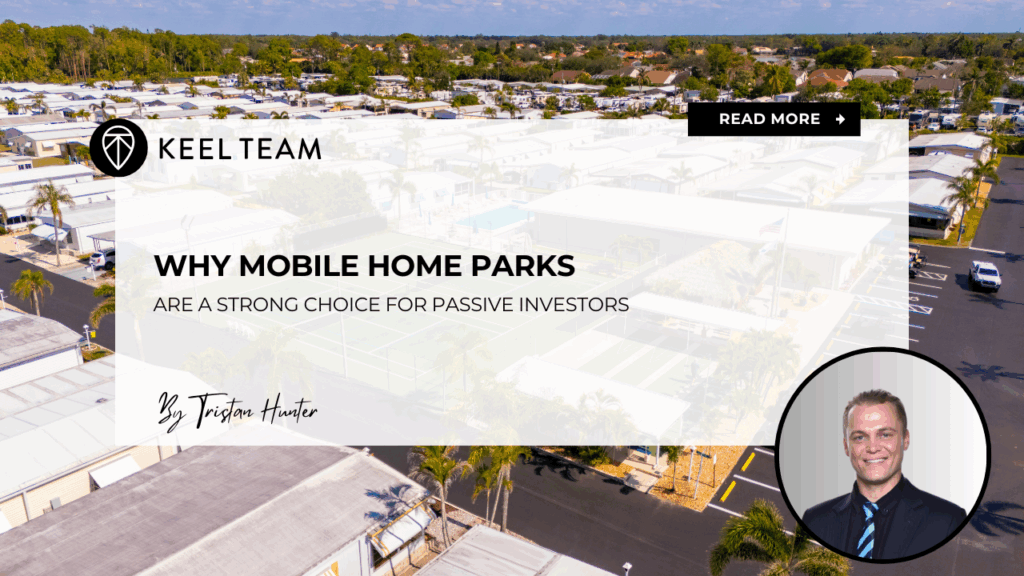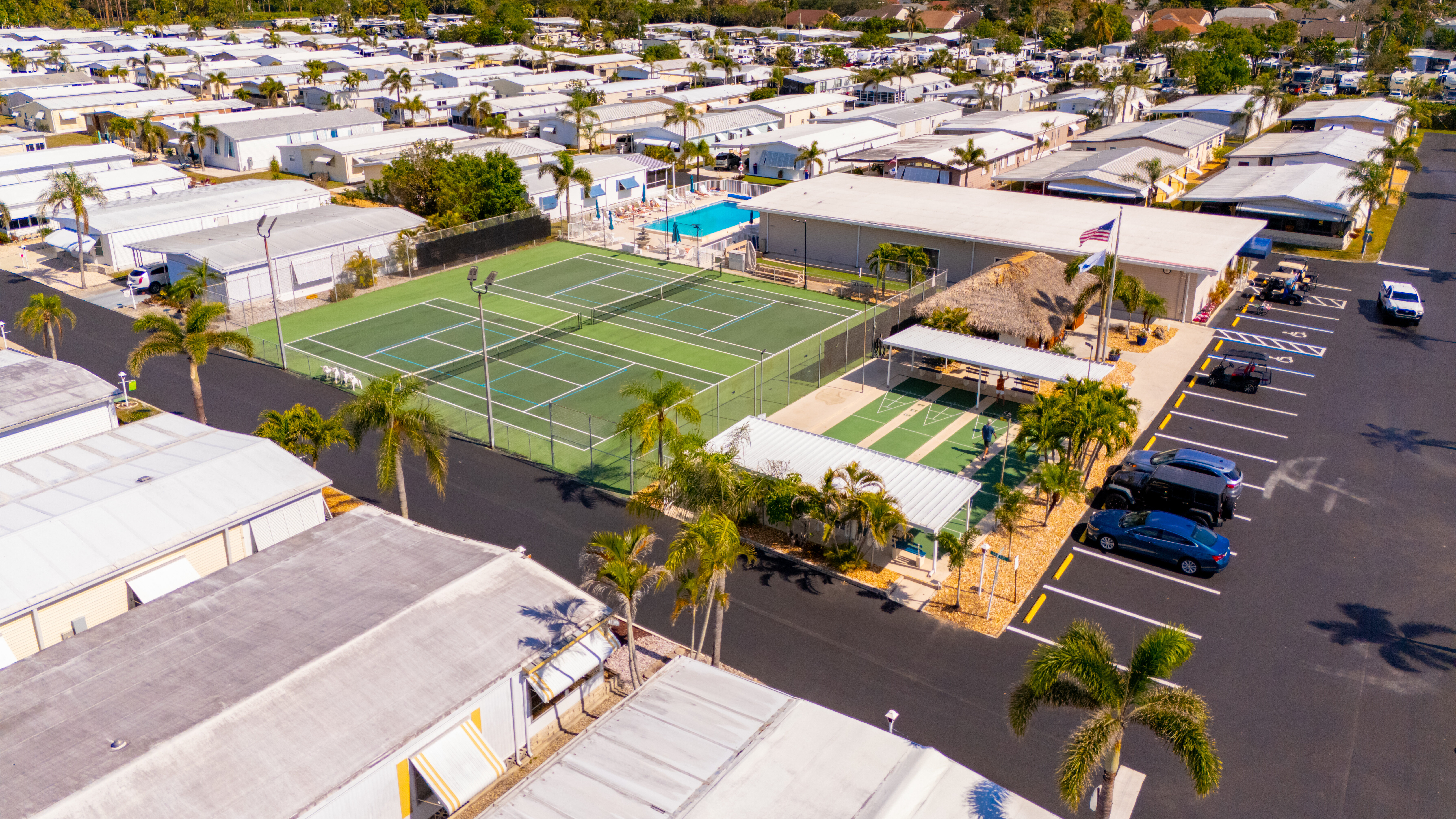Why Mobile Home Parks Are a Strong Choice for Passive Investors
-
 Tristan Hunter - Investor Relations
Tristan Hunter - Investor Relations

Passive investing continues to draw interest from individuals who want exposure to real estate without taking on the demands of direct property management. Among the many options available, mobile home park investing has been gaining attention. Mobile home parks offer unique characteristics that can make them an appealing option for passive investors looking for long-term, cash-flow-oriented opportunities. In this article, we will explore why mobile home parks can be a strong choice for passive investors, how they compare to other real estate sectors, and what factors make them stand out in today’s investment landscape.
Understanding Passive Mobile Home Park Investing
What Is Passive Investing in Mobile Home Parks?
Passive mobile home park investing typically involves participating in a syndication or fund. In this structure, investors provide capital while an experienced operator handles day-to-day responsibilities such as acquisitions, management, maintenance, and eventual exit strategies.
This approach allows individuals to benefit from potential cash flow and appreciation without becoming directly involved in the operations of the mobile home park.
Why Mobile Home Parks Are Different
Mobile home parks differ from other real estate asset classes because they primarily rent land rather than buildings. Residents usually own their homes but pay a monthly lot rent for the space their homes occupy. This arrangement can lower maintenance responsibilities compared to multifamily apartments or single-family rentals.
Download our FREE eBook on the Top 10 things to know BEFORE investing PASSIVELY in mobile home parks!
The Growing Demand for Affordable Housing
Limited Supply of Mobile Home Parks
One of the most significant drivers behind mobile home park investing is the limited supply of communities across the United States. Local zoning restrictions and community opposition have slowed down the development of new mobile home parks for decades. As a result, the existing supply remains relatively fixed, while demand for affordable housing continues to grow.
Increasing Demand for Affordable Living Options
Housing affordability is a challenge across the country, and mobile home parks provide one of the most cost-effective housing solutions. Since mobile homes often cost significantly less than traditional housing, many families and individuals turn to these communities as an affordable option. This demand can support stable occupancy rates, which may be attractive to passive investors.
The Potential for Consistent Cash Flow
Stable Tenant Base
Residents in mobile home parks often stay for many years because moving a mobile home is expensive and logistically challenging. This tendency toward long-term tenancy can result in relatively steady cash flow for investors.
Predictable Lot Rent Income
Because residents typically own their homes, lot rent becomes the primary revenue stream. This income model can reduce the level of ongoing maintenance and repair costs that investors might encounter in other types of rental properties. As a result, investors often view mobile home parks as an asset class with the potential for consistent cash flow.
Resilience During Economic Shifts
Affordable Housing as a Need
Mobile home parks fall into the category of affordable housing, which may be less affected during economic downturns compared to luxury housing. While no investment is entirely immune to economic cycles, affordable housing tends to remain in demand as people seek cost-effective living solutions during challenging times.
Historical Performance Trends
In previous economic downturns, mobile home parks have often demonstrated resilience compared to other real estate sectors. The combination of limited supply, consistent demand, and relatively low operating costs has allowed many operators to maintain occupancy and revenue even when broader markets slowed.
Lower Operating Costs Compared to Other Assets
Reduced Responsibility for Structures
Since tenants usually own their homes, investors are often responsible only for the land, infrastructure, and community amenities. This reduces the amount of capital required for repairs and maintenance compared to multifamily properties, where landlords are responsible for every unit’s upkeep.
Economies of Scale in Larger Communities
In larger mobile home parks, management can benefit from economies of scale. The costs of maintaining roads, utilities, and common areas spread across more lots, which can create operational efficiencies. For passive investors, this structure may increase the appeal of investing in well-managed communities.
The Role of Professional Operators
How Syndications Benefit Passive Investors
Most passive investors participate in mobile home park syndications, where professional operators manage the acquisition, financing, and day-to-day oversight. Experienced operators often have established systems for rent collection, resident management, and property improvements.
This professional oversight can help passive investors feel more confident that the community is being managed effectively, even if they do not have prior real estate experience.
Alignment of Interests
In many syndications, operators invest their own capital alongside passive investors, creating a shared interest in the performance of the mobile home park. This alignment of incentives can help ensure that the operator remains motivated to maximize value.

Potential for Value-Add Opportunities
Infrastructure Improvements
Mobile home parks often present opportunities to improve infrastructure, such as upgrading utility systems, adding amenities, or enhancing landscaping. These improvements may increase resident satisfaction and support stronger occupancy rates.
Filling Vacant Lots
Many mobile home parks include vacant pads that can be filled with new or used mobile homes. By increasing occupancy through strategic lot filling, operators can grow the revenue base and potentially enhance returns for passive investors.
Considerations and Risks for Passive Investors
Regulatory and Zoning Challenges
Mobile home parks can face zoning restrictions and regulatory hurdles. Local governments may impose limitations on expansion or redevelopment, which can affect future opportunities.
Management Sensitivity
While mobile home parks can be operationally efficient, poor management can quickly lead to resident dissatisfaction and lower occupancy. Passive investors should evaluate the experience and track record of syndicators before investing.
Market Conditions and Financing
As with all real estate, mobile home parks are subject to market conditions, interest rates, and availability of financing. These factors can influence both short-term cash flow and long-term exit strategies.
Comparing Mobile Home Parks to Other Real Estate Options
Mobile Home Parks vs. Multifamily Apartments
Multifamily apartments typically require significant ongoing maintenance and capital expenditures. Mobile home parks, by contrast, can have lower structural responsibilities, making them appealing to passive investors who prefer fewer maintenance risks.
Mobile Home Parks vs. Single-Family Rentals
Single-family rentals can provide flexibility, but they often lack the economies of scale that mobile home parks provide. By consolidating multiple tenants in one community, mobile home park investing may create more efficient operations.
Long-Term Outlook for Passive Investors
Demographic and Housing Trends
Demographic shifts and affordability challenges are likely to keep demand for mobile home parks strong. As more people seek affordable housing solutions, communities that are well-located and professionally managed may continue to attract long-term tenants.
Potential for Steady Growth
While mobile home park investing cannot promise specific returns, the unique supply-demand imbalance combined with professional management creates conditions that many passive investors view positively. This outlook suggests that mobile home parks could remain a notable option in diversified real estate portfolios.
Conclusion
Mobile home parks present a combination of limited supply, strong demand for affordable housing, and operational efficiencies that can make them an appealing choice for passive investors. By participating through syndications or funds, investors may potentially benefit from consistent cash flow, long-term stability, and opportunities for value creation without directly managing the property.
While risks such as regulatory challenges and market fluctuations exist, the fundamentals of mobile home park investing remain compelling in the broader landscape of passive real estate opportunities. For passive investors seeking a potential balance of income and stability, mobile home parks can represent a strong option worth considering in a diversified portfolio.
Are you looking for MORE information? Book a 1-on-1 consultation with Andrew Keel to discuss:
- A mobile home park deal review
- Due diligence questions
- How to raise capital from investors
- Mistakes to avoid, and more!
Disclaimer:
The information provided is for informational purposes only and is not investment advice or a guarantee of any kind. We do not guarantee profitability. Make investment decisions based on your research and consult registered financial and legal professionals. We are not registered financial or legal professionals and do not provide personalized investment recommendations.

Tristan Hunter - Investor Relations
View The Previous or Next Post
Subscribe Below 👇





